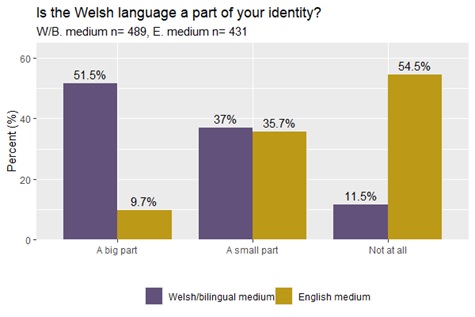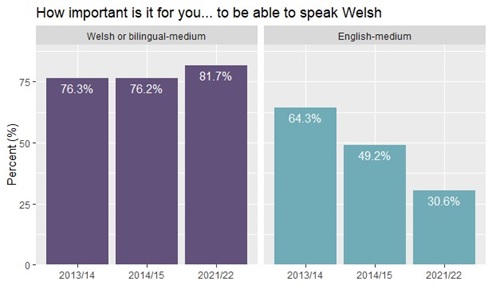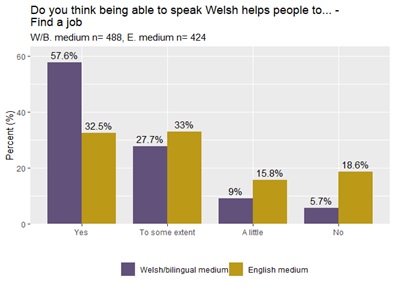Welsh language and identity
2022’s WISERD Multi-Cohort Study of secondary school children across Wales provides valuable insight into the attitudes of pupils towards the Welsh language. As we might expect, results vary according to school medium as to whether pupils consider the Welsh language to be a part of their Welsh identity.
Pupils in English-medium schools are far less likely to connect with the language, with 54.5% saying it is not at all part of their identity. Most pupils in Welsh- or bilingual-medium schools say the language is at least some part of their personal identity (89%).

Figure 1
Decline over time in English-medium schools
When comparing pupil views on the importance of learning Welsh over time, the trends are also strikingly split by school medium – consistent with their lack of connection to the language. However, our study found that the responses to the questions ‘How important is it for you to (be able to) speak Welsh’ and ‘How important is it for you to (continue to) learn Welsh’ show that pupils attending English-medium schools in Wales now find learning and speaking Welsh far less important than they used to, whereas there has been little change in Welsh- or bilingual-medium schools.

Figure 2
Despite this lack of perceived importance, pupils seem to associate knowledge of Welsh with positive outcomes, though these views are not as strong at English-medium schools. 58% of pupils at Welsh- or bilingual- medium schools think that speaking Welsh helps people to find a job, whereas at English-medium schools there is more variation in views.

Figure 3
Results are similar for “Welsh helps people to learn another language”, though do not extend to areas of life in Wales including “fitting in more at work” or “in higher education”. While Welsh- or bilingual-medium pupils feel that the ability to speak Welsh will have a positive impact on their future trajectories, pupils at English-medium schools are more divided on the matter.
Lack of confidence to learn
Despite Welsh- and bilingual- medium pupils being confident speaking Welsh overall (71%), 3 in 5 report a lack of confidence in classroom settings. For many, especially at English-medium schools – where confidence is lower, the classroom is the only environment in which they engage with Welsh.
Lack of motivation
Pupils who already speak Welsh are more in agreement of the opportunities that their language skills afford them. On the other hand, many young people in Wales feel they will have to leave Wales in order to find work, meaning that their motivation to speak Welsh to any degree of fluency is dampened further by their perceived prospects.
Combined with a lack of connection to the Welsh language, declining views on its perceived importance, and a lack of confidence in their language skills, the majority of Welsh pupils at English-medium schools have little to motivate their learning. This does not bode well for future generations of confident Welsh speakers from these schools.

